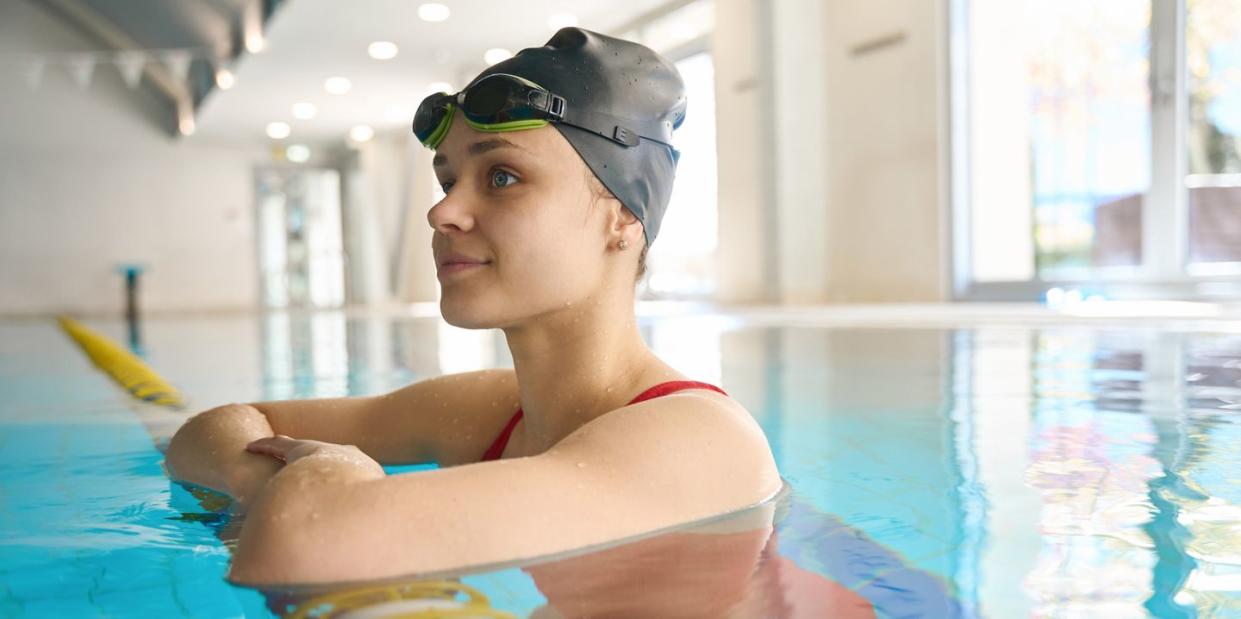12 reasons you should take up swimming ASAP

The benefits of swimming are vast, but chances are it's probably not as regular a part of your workout routine as, say, strength training, reformer Pilates, or weightlifting. If these are the forms of exercise that make you feel your best, then we're certainly not saying you should give them up, but if swimming is something you like but often put off (no swimsuit, CBB to shave - you know the drill), then you should probably read this.
Keep scrolling for 12 benefits of swimming.
Health benefits of swimming
Regular pool attendance could make you smarter, improve your mental health and enhance your lung capacity, and that's not all. According to the NHS, adding a weekly swim workout to your training plan can reduce the risk of chronic illnesses, such as heart disease, type 2 diabetes and strokes.
You can also expect full-body toning and improved stamina, which translates nicely into improved overall fitness levels and capabilities. Cross-training (exercising in different ways) is a fantastic way to improve your overall fitness.
We spoke to Emily Morrissey, a Swimming Instructor for Swimming Nature, for her expert know-how on the benefits of swimming.
12 benefits of swimming
It improves your mental health
Swimming is one of the few sports that demand you leave the outside world, outside. You physically can’t look at Instagram in the pool, so one of the biggest benefits of swimming is that it’s great for giving the mind time to power down from constant digital stimulation.
Morrissey says, 'many people say that by simply being in the water they feel more relaxed and less stressed. Regular exercise helps reduce anxiety and depression, as it releases "feel good" hormones and keeps our brains working in a healthy way.'
Plus, she suggests if you embrace open water swimming and not just in your local pool you can reap more rewards: 'Learning to swim can allow you the opportunity to swim in beautiful places outdoors which many people find to be memories they cherish.'
Research has found that hitting the pool was comparable to Yoga in terms of reducing anxiety and stress over a 12-week period.

It increases your fitness and muscle mass
NHS guidelines suggest that in order to stay healthy anyone aged 19 to 64 should be doing at least 150 minutes of moderate aerobic activity a week. This can include anything from running and walking to circuit training or HIIT workouts at home.
If you choose to do particularly vigorous activity, such as fast swimming, you can slash this to 75 minutes – which is only just over an hour each week.
Swimming for fitness is easy to do, you simply speed up. Plus, another benefit of swimming is that it can help build muscle. Morrissey explains: 'It offers the potential to tone up pretty much everywhere. Someone who starts working hard in the pool could expect to see more definition in their arms, upper body and thighs in particular.'
It's all thanks to swimming providing a consistent resistance pattern so muscles are taxed hard and therefore "tone up".

It's lower impact than other forms of cardio
Sore knees and ankles a common complaint of yours? Well, know you're not alone. High-intensity workouts can exacerbate already aching joints (think running or super challenging cardio home workouts) but swapping a few sessions for some pool laps could do you the world of good.
'A runner will exert anything from 5-10 times their body weight through their hips, ankles and knees,' Morrissey says. 'As water naturally holds you up, it can reduce your moving body weight by up to 90%, this reduces the stresses and impact on your joints, muscles and bones by the same 90%. Which is huge!'
'Yes, running or cycling will usually burn more calories than swimming,' she continues. 'But a benefit of swimming is that it keeps your heart rate up without stressing your body.' This type of exercise is known as steady-state training (LISS) and helps to build stamina.
Indeed, one study on people with osteoarthritis showed that swimming could cause significant reductions in joint pain and stiffness.

Swimming could help you drift off more quickly
Aerobic exercise (e.g. any cardio activity) has been linked to better sleep quality and improved sleep duration, making for another benefit of swimming. Music to our sleepy ears. According to one study, getting sweaty is the passport to a good night's kip – something we absolutely love to hear.
The results indicated that when embracing regular exercise, plus good sleep hygiene, you can improve sleep quality, mood and quality of life.
RELATED: 'I tried clean sleeping for 2 weeks, here's what happened'

It's generally a pregnancy-safe exercise
Firstly, all pregnancies are different – checking with your GP about what's what before you start any exercise regime is crucial.
That said, generally speaking, one of the major benefits of swimming is that it's a pregnancy-safe form of exercise. The water supports you and bump and can help to reduce swelling in the ankles and feet.
And that's not all. Research has found that pregnant women who swim during their early to mid-pregnancy can have a lower risk of preterm labour and congenital defects, while another study showed no adverse effects of swimming in chlorinated pools while pregnant. In fact, pregnant women who swam during their early to mid-pregnancy had a lower risk of preterm labor and congenital defects.
RELATED: Everything you've ever wanted to know about pregnancy yoga

There's more than one way to do it
Unlike other forms of exercise where perhaps, there's little variety, there are various strokes you can use to keep your swimming workout fresh, including:
breaststroke
backstroke
sidestroke
front crawl
butterfly
Changing up your stroke will often change the muscles worked, plus, certain strokes such as front crawl lend themselves to faster cardio workouts, while breaststroke can be done as a LISS (low-intensity steady state) workout.
TIP: If you find that doing certain strokes makes your sessions shorter (e.g. front crawl), you could be doing them wrong, says Morrissey. 'People with poor technique are often stuck to short bursts where they have to completely stop to recover. Swimming with good technique allows us to swim more effortlessly and with variable pace.' That includes faster and slower.

You can create definition with different strokes
One of the major benefits of swimming is that water works to create whole-body resistance. Pushing in any of the major strokes will work out your whole body, but some will work certain areas a little more than others.
1. Breaststroke
It may be slower, but it is the best stroke for an all-over body workout. Helping to strengthen the upper body, back and chest, it also involves breathing out into the water which increases the resistance on your chest, which can improve your lung functions.
And if that wasn’t enough it also helps to tone the thighs and lower legs more than other strokes, due to its more complex leg movement.
2. Front crawl
The speedy stroke, it is also the easiest one for most to master. Lucky then that it like all strokes, it shapes your whole body, however its USP is that it is the one to really tone your upper body.
Front crawl uses the deltoids which are the muscles in our shoulders, the side of the back, the triceps and bicep muscles of our arms.
3. Backstroke
The elegant stroke. Nail a good technique with this one and it can help improve your overall posture. It is also excellent for core strengthening and opening up the chest muscles. Backstroke is the one to help shape your upper back, lower back and thighs.
4. Butterfly
The calorie burner. If you can keep it up, it is undoubtedly the stroke that burns the most calories. You need a lot of power for Butterfly, as it needs strong triceps and bicep muscles.
It can help strengthen the shoulder muscles as you rotate the shoulders, and this develops the deltoid muscles.
As well as the back and chest, it takes a lot out of your legs and is one of the keystrokes that focuses on building a strong core.

Learning new strokes and seeing improvement is majorly satisfying
Not only will it keep things interesting but mixing up your strokes will also give muscles and joints a break from continuous actions if you’re swimming for a long time.
Morrissey explains, 'All strokes complement each other well, in that getting better at backstroke will help your front crawl or breaststroke.'
To improve your technique, Morrissey suggests to 'break down' strokes and then put them back together again.
'This is so you’re really focusing and perfecting that skill. Try doing lengths of a certain stroke with just the kick and without using your arms, then follow it with the full technique and bring the arms back in.
'You can also do a few lengths just focussing on your arms, so just letting the legs float behind you.'
Paying attention to particular areas will help you get a better overall stroke and workout.

It can reduce stress
Exercise is a well-known mood booster, but did you know that another benefit of swimming is that it can help mitigate the effects of stress chemically, too?
When you exercise, your body naturally reduces stress hormones cortisol and adrenaline whilst simultaneously creating feel-good endorphins – nature's mood lifters. If you're stuck between work and a stressed place, carve out some time to move, in the pool or otherwise.
What's more, as above, research shows that swimming could be just as effective as yoga for alleviating depression and anxiety.

It can help individuals with mobility issues
A lot of us take the gift of free movement for granted. However, at one point or another in life you might suffer from a niggly injury or reduced mobility and at these times, make a splash.
Morrissey explains, 'due to the reduction in body weight and stress it puts on your joints, swimming can offer the opportunity to move in ways that you can't on land owing to the support provided by the water.'
As the majority of your body is in constant use when in the pool you can build cardio and muscle strength without adding extra stress or impact to existing problems. That said, do check in with an expert if you have an injury.

Swimming can help women with MS
As the water makes your limbs buoyant, thus helping to support them during exercise, swimming can be a beneficial workout for anyone suffering from MS. But, how?
One study looked at pain levels of MS sufferers in those who swam and those who didn't. Over a 20-week swimming programme, those who did felt less pain.

Swimming can make you smarter
The Griffith Institute for Educational Research, a university in Australia, studied 7000 children under the age of five to see if swimming could affect their intelligence levels. The research showed that children swimming at an early age were mastering skills earlier than normal.
The children who swam regularly had superior motor skills and were more adept at mastering skills like language and mathematics when compared to children who didn't swim.

You Might Also Like


